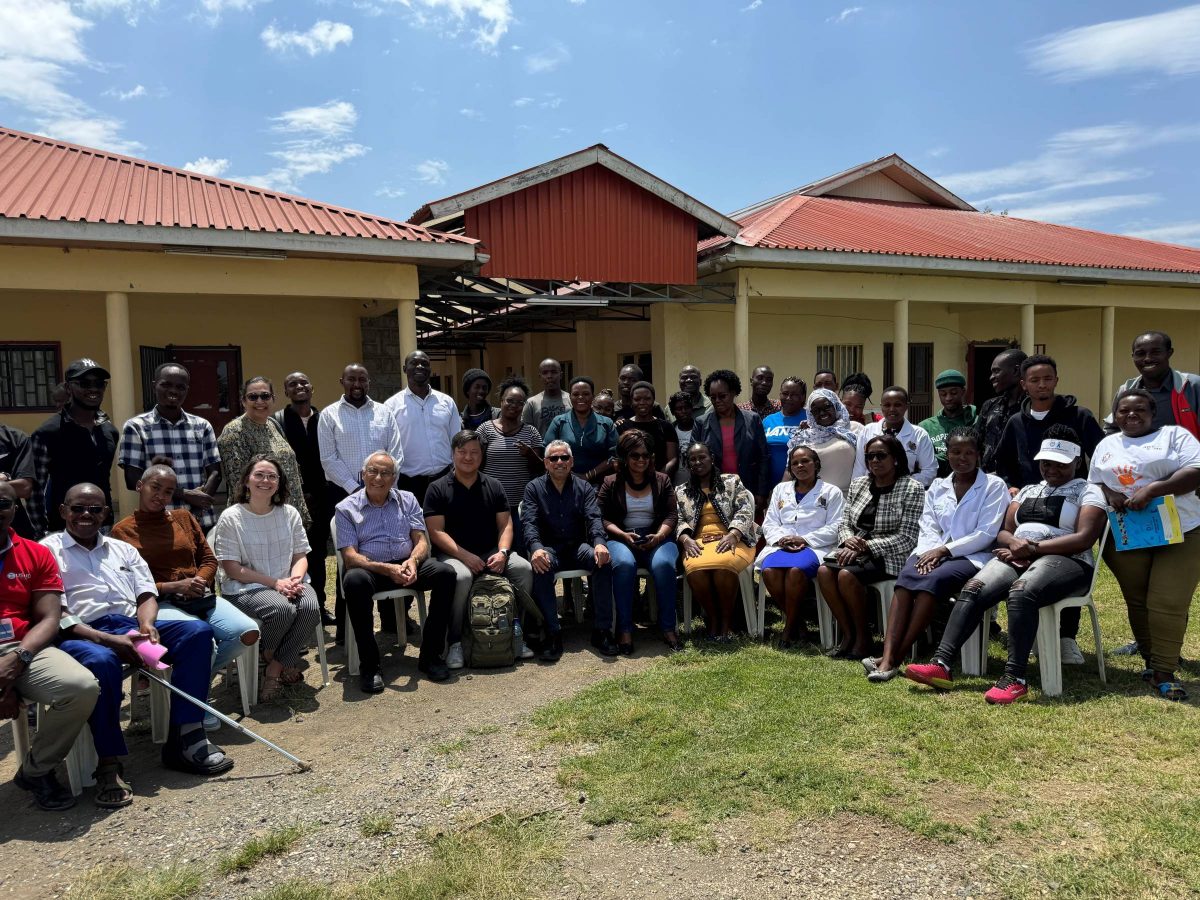
Dr. Mario Pinto, Vice-President (Research and International) visits UM researchers and patient cohorts in Nairobi.
Sex workers, marginalization and health in Africa
Understanding UM’s global impacts on promoting health equity
When UM researchers first arrived in Kenya in the 1980s in partnership with the University of Nairobi, their focus was on addressing the spread of infectious diseases among sex worker communities. As cures and treatments were developed, focus began shifting towards addressing the barriers of accessing healthcare due to the criminalization and stigmatization of Africa’s sex trade environment.
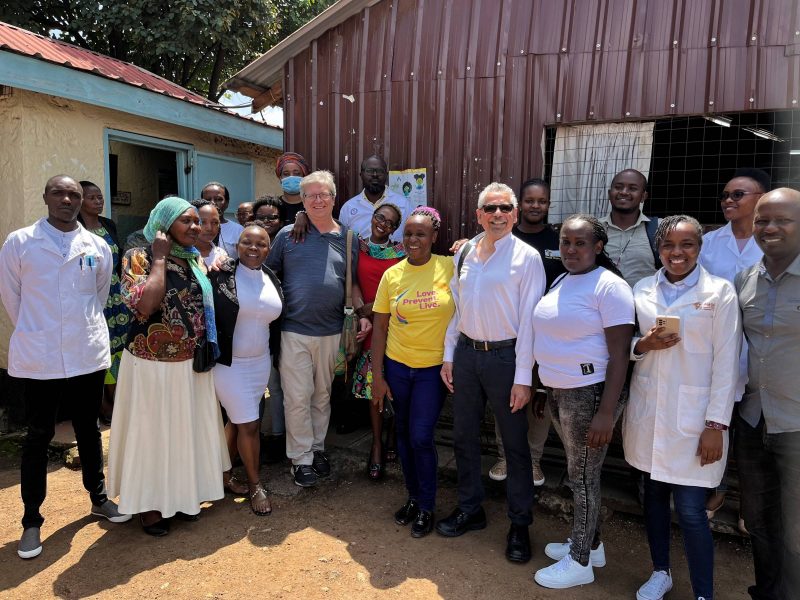
Dr. Keith Fowke and Dr. Mario Pinto with patient cohort at Nairobi research clinic.
Today, UM research in Kenya includes two major inter-related Rady Faculty of Health Sciences programs led by Keith Fowke, Department Head of Medical Microbiology and Infectious Diseases and James Blanchard, Executive Director of the Institute for Global Public Health. Responding to a need for public health advocacy from UM research partners in Kenya, Global Public Health programs expanded to Kenya in 2008 as an extension of successful projects originally started in India.
“Our programs in Kenya are a unique example of how laboratory-based researchers interested in molecules and cells are collaborating with researchers studying issues of stigmatization and together they make meaningful impacts for marginalized people,” said Keith Fowke.
As researchers began working with marginalized patient cohorts, increased need for community-based supports emerged, informing new programs developed by UM researchers Dr. Souradet Shaw Canada Research Chair (CRC) in Program Sciences & Global Public Health, Dr. Marissa Becker, Dr. Lisa Lazarus, Dr. Lisa Avery, Dr. Joshua Kimani, Dr. Larry Gelmon, Dr. Lyle McKinnon, Dr. Julie Lajoie, Dr. Leigh McClarty, Dr. Jason Kindrachuk CRC in Molecular Pathogenesis of Emerging and Re-Emerging Viruses and Dr. Rob Lorway, CRC in Global Intervention Politics and Social Transformation,.
“When I first came to Kenya in 2009 there was a group of young men who were starting to attend clinics established for female sex workers, many of whom identified as gay and bisexual, which is criminalized in Kenya,” said Rob Lorway. “Some were young students, and some were older or married, but what was important is that they had a high HIV prevalence. They came to us because we provided safe spaces from Kenya’s public healthcare system that can be, at times, quite judgmental.”
A legacy of evidence-based support & patient directed research
Four decades ago in the early 1980s, after eradicating an outbreak of the sexually transmitted infection Chancroid in Manitoba, Dr. Allan Ronald was recruited to lead a similar program with the Department of Medical Microbiology at the University of Nairobi, Kenya. Dr. Francis Plummer, then an infectious disease fellow on Ronald’s team studying with a group of sex-workers, would gain global renown for the discovery of a link between the spread of sexually transmitted diseases and the emerging HIV/AIDS epidemic.
Among the patient cohort exposed to HIV/AIDS, Plummer and his team identified a group of women with a natural immunity to HIV-1, the virus that leads to AIDS. Over the following 17 years UM researchers, including Fowke, studied the immune system of these women leading to new approaches to HIV prevention. The women participating in the study had contributed to saving and improving the lives of tens of millions of people living with HIV around the world but continued to live a criminalized lifestyle at the fringes of society.
Dr Elizabeth Ngugi, a local public health nurse working with Plummer in managing the patient cohort in the 1980s and ‘90s, recognized the adversity these women and others like them endured each day. Through advocacy, a new patient-directed research model was developed to foreground the needs and voices of patients as fully recognized research partners, rather than research subjects.
Keith Fowke, who was a graduate student at UM labs in Kenya at that time, recalls of Dr. Ngugi, “she was a very direct and clear-thinking woman. Beginning in 1984, Dr. Ngugi developed a peer educator model to train sex workers and support them as informed and educated leaders within the community. Dr. Ngugi’s influence has been global and has resulted in a deep 40-year relationship with this community which has now evolved into the Sex Worker Outreach Program (SWOP) which has been adopted as a best-practice model by the World Health Organization, UN AIDS and countless others.”
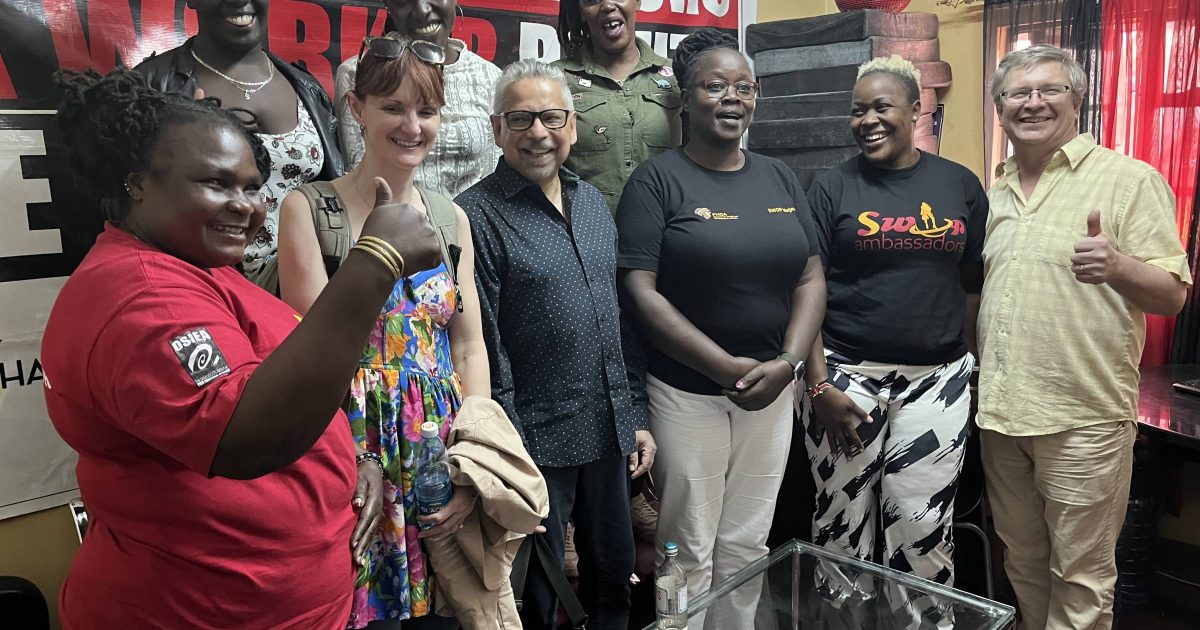
Dr. Julie Lajoie (second from left), Dr. Mario Pinto, Joyce Adhiambo (pictured in SWOP t-shirt) and Dr. Keith Fowke pictured here.
Now in 2024, UM infectious disease research in Nairobi encompasses 10 SWOP clinics providing HIV prevention and care services to more than 30,000 female sex workers, about 9000 men who have sex with men and close to 1500 transgender individuals. Supported by Joshua Kimani and Larry Gelman who follows in the legacy left by Dr. Ngugi, some patient partners are now respected community organizers like Joyce Odhiambo with SWOP Ambassadors, who presented to EU Parliament in Brussels in 2018.
Current clinical programs funded by the President’s Emergency Plan for AIDS Relief (PEPFAR) deliver HIV care and prevention services. However, due to the criminal status of sex work and homosexuality in Kenya, the mere presence of HIV medications or even condoms could provoke harassment or police response.
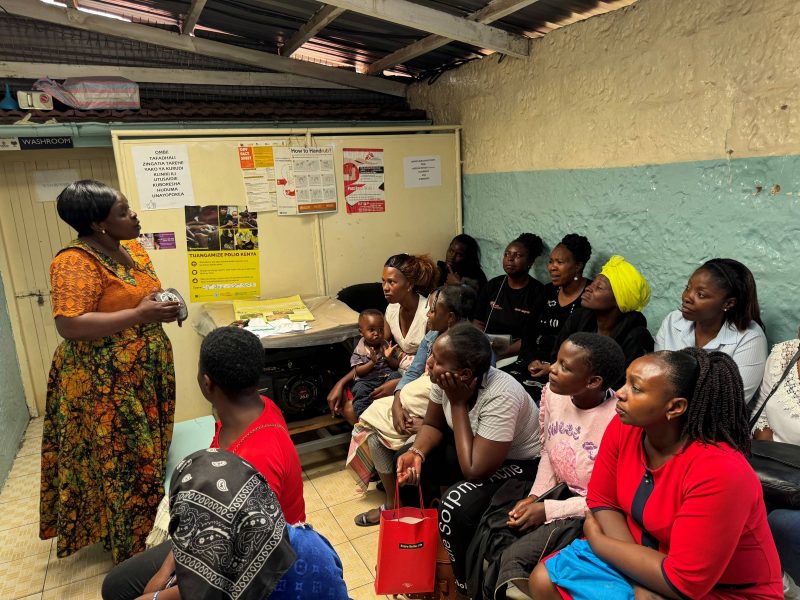
Members of the patient cohort meet at a Nairobi health clinic.
“In Kenya 4% of the general population is infected with HIV, and in sex workers it’s about 28%,” said Fowke. “Despite these high risks, many women in our cohort choose not to take anti-HIV drugs to prevent infection because of the stigma resulting from their association with being used to treat HIV infection. We are working on providing new approaches to HIV prevention that would be acceptable to these women, including the anti-inflammatory drug, aspirin, which may prevent the immune cell HIV infects from entering the vaginal mucosal environment thereby preventing infection.”
Community empowerment through global public health research
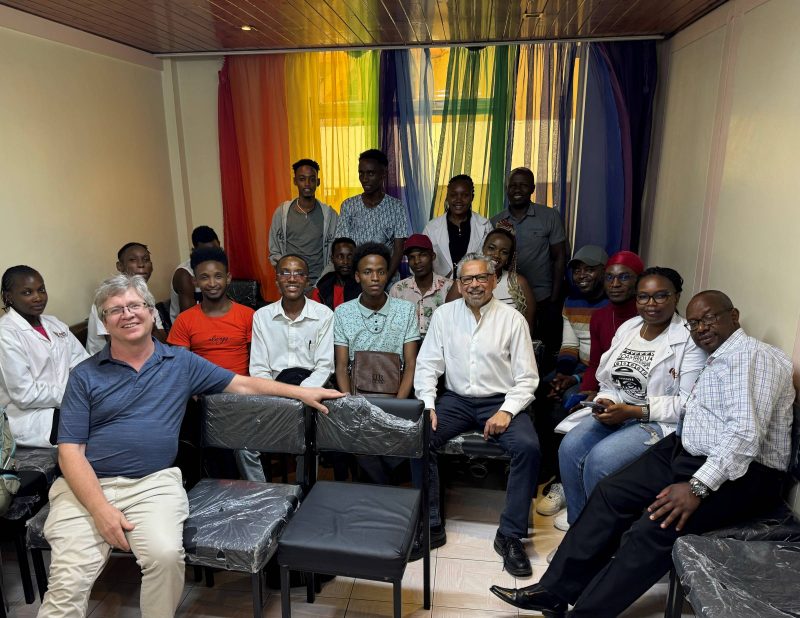
Members of the male patient cohort meet with Dr. Keith Fowke and Dr. Mario Pinto.
“We’re talking about marginalized and stigmatized people, whose lives and livelihoods are criminalized,” said Lorway. “Within the first year of our program 12% of men who have sex with men who originally tested negative for HIV were testing positive. So, despite clinicians doing everything they could at the time – providing risk reduction counseling, supplying condoms and lubricant – HIV infection was growing among these men in our cohort.”
Tourism in Kenya has influenced hotspots where gay and bisexual men can congregate and celebrate themselves. By mapping these hotspots, the Global Public Health team have provided local clinicians and community organizations the ability to establish program catchments and generate their own accurate community health data to inform program coverage targets that guide the funding priorities of donors and the Government of Kenya. Furthermore, by providing training to community leaders so that they can cultivate their own research agenda, now community leaders are coming to Lorway and the team for support with their own investigations.
These expanding partnerships have paved the way for organizations like SWOP Ambassadors, who provides legal aid training and support to sex workers and engages with police to ensure that the right to access healthcare services is respected. The internationally-funded community based organization, HOYMAS (Health Options for Young Men on HIV, AIDS, and Sexually transmitted infections) has now established a clinic in Nairobi which guarantees non-discriminatory care and runs anti-stigma campaigns focused on sexual health and human rights advocacy.
“The shifting scope of Global Public Health research in Kenya is a strong sign of transformational success,” said Mario Pinto, Vice-President (Research and International). “The work of these dedicated researchers and clinicians to advance health as a human right has empowered these underserved communities, not just in self-advocacy, but as entrepreneurs and leaders in their field on the international stage. We know that when people of sexual minorities live free of harassment and stigmatization, they are more likely to access life-saving medical care and be their authentic selves.”
CFI-Funded laboratory provides much-needed sex worker outreach programs
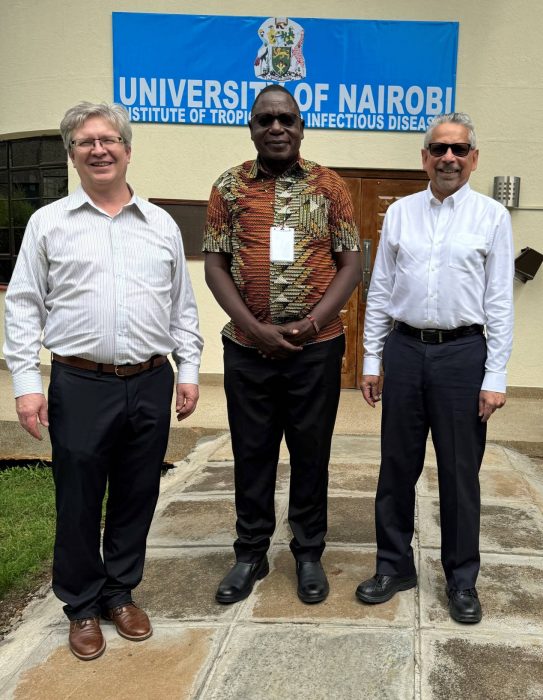
Dr. Keith Fowke and Dr. Mario Pinto pictured with Dr. Julius Oyugi, Director of the University of Nairobi Institute for Tropical and Infectious Diseases
In Kenya, UM has partnered with the University of Nairobi to build a Canada Foundation for Innovation funded lab on their campus and has now developed 10 different SWOP clinics across the city as part of ongoing sex worker outreach programs. “When we first started this program, there wasn’t much medical research infrastructure in Kenya, now I’m supervising Kenyan PhD students doing cutting edge research projects without having to leave their country and we are able to hire all staff locally through with grants available to African institutions,” said Keith Fowke.
Decades of results in overcoming epidemics and securing international funding from partners including Bill & Melinda Gates Foundation and the Global Fund to Fight AIDS has helped to foster good relationships with government. health officials have signaled a willingness to collaborate on efforts to prevent an emerging epidemic of anal cancer among men who have sex with other men resulting from the sexually transmitted infection HPV.
“We have begun addressing an epidemic of cervical cancer resulting from HPV among female sex workers, but a different approach is needed to provide care for men who have sex with men,” said Lorway. “Hate speech almost constantly enters the political theatre during times of economic disruption like the COVID-19 pandemic, so it’s often about quiet negotiations with health official — which can be frustrating because of the urgent need for care. Working with our local partners we’ve established new provisions for anal health care for men who have sex with men. Although working in such a prohibitive political climate can be challenging, these partnerships provide the room we need to discretely develop programs without provoking a negative public reaction.”
Research impacts at home in Manitoba
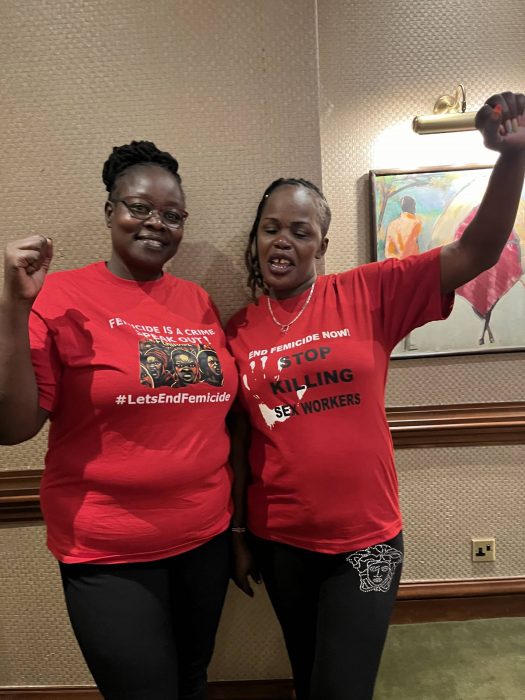
Joyce Adhiambo (left) and Victoria Were (right)
“There is a presumption that access to care and sex worker support programs are less advanced in the global south. However, in Canada, by criminalizing the clients, we push sex works even further underground,” said Lorway. “Criminalizing sex work makes it extremely difficult to deliver health services. In this case we have something to learn from our work in Kenya about how to provide services to those who are hardest to reach.”
Leading the way in sex work advocacy in Manitoba is the Sex Workers of Winnipeg Action Coalition (SWWAC) who are partnering with UM infectious disease expert Julie Lajoie, to facilitate an ongoing information exchange between the sex worker communities in Nairobi and Winnipeg. Two community leaders came to Winnipeg in 2022 to discuss their role as grant co-applicants and to share strategies on getting organized in the face of criminalization and public stigma.
“In Canada, we have a parallel issue of Missing and Murdered Indigenous Women, and tragically, there are commonalities in the experiences of marginalized people on both sides of the ocean,” said Keith Fowke. “In Manitoba we’re at least a decade behind African programs in HIV prevention approaches. There are more new cases of HIV in Manitoba this year than in epidemic of the 1980s and ‘90s, and it’s mainly among women in indigenous communities. We need to adapt global best-practices to prevent infections in Manitoba.”
The Winnipeg-based community resource center Sunshine House is leading the way in Manitoba by offering HIV and sexually transmitted disease testing services and have held a Science + Supper, often featuring presentations from UM Faculty members.
“Programs like those offered at Sunshine House, SWWAC and SWOP Ambassadors are foundational,” said Lorway. “Something we as researchers can always work toward is the de-monopolization of science, to put the power to make change into the hands of those who most urgently need it.”
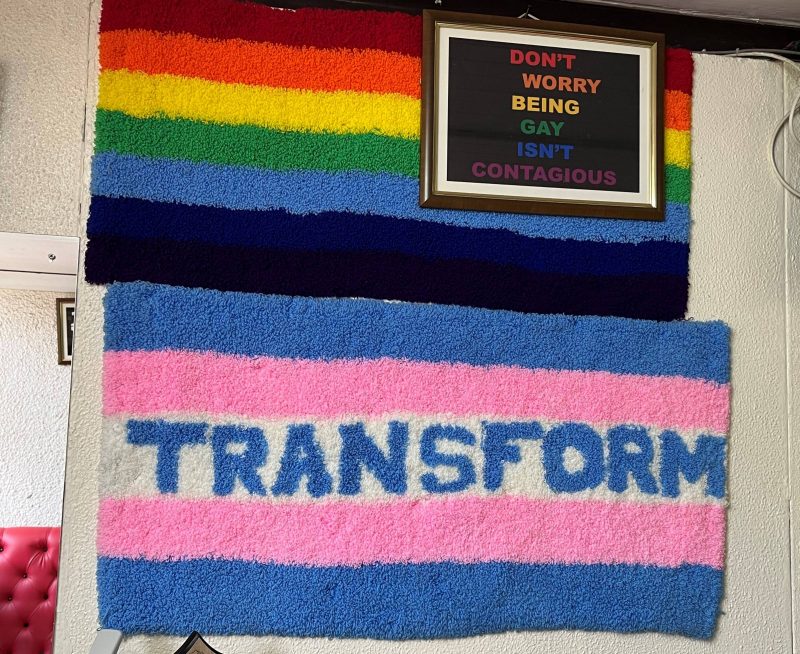
Research at the University of Manitoba is partially supported by funding from the Government of Canada Research Support Fund.






